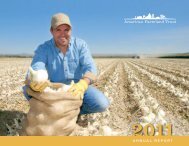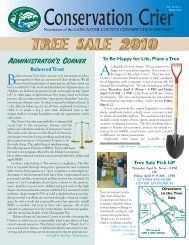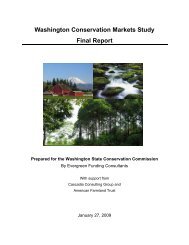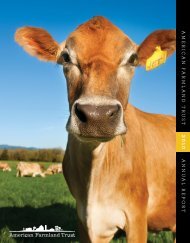Farms for the Future: Massachusetts - American Farmland Trust
Farms for the Future: Massachusetts - American Farmland Trust
Farms for the Future: Massachusetts - American Farmland Trust
Create successful ePaper yourself
Turn your PDF publications into a flip-book with our unique Google optimized e-Paper software.
CHAPTER ONECommonwealth <strong>Farms</strong>: Many Products, Many Benefits<strong>Massachusetts</strong> has a rich and diverse heritage of farming, and <strong>the</strong> Commonwealth’s agriculturecontinues to be an integral part of <strong>the</strong> state’s economy, culture and landscape. From cranberry bogs toapple orchards, dairy farms to greenhouses, vegetable fields to livestock operations, <strong>the</strong> state’s diverseagricultural industry remains composed primarily of family farms, which are increasingly focused onvalue-added products and direct-to-consumer marketing to improve farm profitability.Some of <strong>the</strong> public benefits of <strong>the</strong> state’s 6,100 farms and 519,000 acres of land in farms are readilyapparent—<strong>the</strong> scenic beauty of a pumpkin field in <strong>the</strong> fall or a pasture of grazing dairy cows in <strong>the</strong>summer, <strong>the</strong> availability of fresh-picked fruits and vegetables from June through November. O<strong>the</strong>rbenefits are not as obvious, such as farmland’s contribution to water quality, flood storage and carbonsequestration; <strong>the</strong> access often offered to neighbors and community residents <strong>for</strong> hunting, walking orsnowmobiling; or <strong>the</strong> role of farms in keeping town budgets balanced.Generating Revenue and Jobs<strong>Farms</strong> are a vital component of <strong>the</strong> state’s economy.The Commonwealth’s farms generate$384 million in annual sales of farm products,employ 13,545 workers and spend nearly$216 million statewide on inputs such as feed,seed, livestock, fertilizer, electricity and fuel.<strong>Massachusetts</strong> farmers also pay $23 millionannually in local property taxes. 1 The economicimpact of farming can be particularly large insome communities. For example, a 2006 studyper<strong>for</strong>med by First Pioneer Farm Credit foundthat <strong>the</strong> total economic impact of agriculture inCarver is over $55 million per year. 2The Commonwealth’s agrarian heritage is anintegral part of <strong>the</strong> state’s appeal to tourists.Picturesque pastures and orchards, rural villagesanchored by working farms, and bountiful harvestsof seasonal farm products clearly play alarge role in attracting <strong>the</strong> estimated 31 millionvisitors who spend over $12 billion each year. 3Helping Balance Municipal BudgetsLike commercial properties, farmland helps tobalance municipal budgets. Cost of CommunityServices (COCS) studies done in towns andcounties across <strong>the</strong> country consistently show thatfarmland generates more in local property taxesthan it requires in local municipal services.Conversely, residential development generallyfails to generate sufficient tax revenues to offset<strong>the</strong> costs of providing services to its residents.Unlike human residents, cows don’t play soccerand cranberries don’t go to school, so farms“Fingertip Facts”about <strong>Massachusetts</strong> AgricultureCash receipts$384 million<strong>Farms</strong> 6,075<strong>Farmland</strong>518,570 acresAverage farm85 acres<strong>Farmland</strong> value$9,234/acre<strong>Farms</strong> with hired labor 1,770Workers 13,545Wages paid$99 millionFarmers’ markets 141Roadside stands 414Food manufacturers 2,600Revenue$6 billionCash ReceiptsGreenhouse/nurseryFruit/vegetablesCranberriesMilkLivestock/poultryO<strong>the</strong>r cropsCattle36%20%12%12%9%9%2%Source: <strong>Massachusetts</strong> Department of Agricultural Resources(MDAR); data based on 2002 Census of Agriculturerequire little in <strong>the</strong> way of town services orinfrastructure. Even when assessed at its agriculturalvalue, as it is under Chapter 61A in<strong>Massachusetts</strong>, farmland helps to finance neededtown services. 4<strong>American</strong> <strong>Farmland</strong> <strong>Trust</strong>1



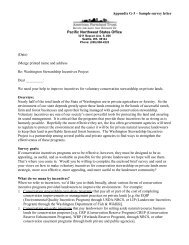

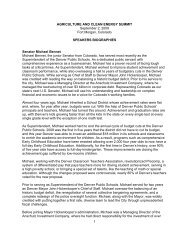
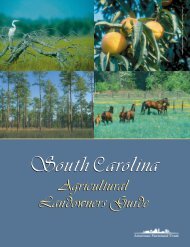
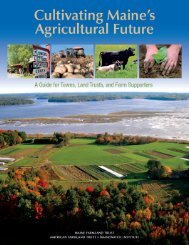
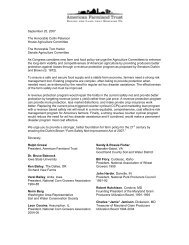
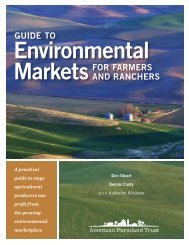
![Farmland by the Numbers [PDF] - American Farmland Trust](https://img.yumpu.com/31549391/1/190x245/farmland-by-the-numbers-pdf-american-farmland-trust.jpg?quality=85)
